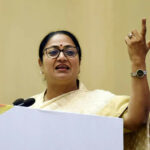Unlock the Editor’s Digest for free
Roula Khalaf, Editor of the FT, selects her favourite stories in this weekly newsletter.
It is a good thing that the Royal Albert Hall installed a modicum of air conditioning some years back. With a heatwave outside, even one of the mild English kind, this could have been one of those old Proms nights when the music was interrupted by the periodic thud of standees in the arena hitting the floor as they fainted.
David Pickard, director of the BBC Proms since 2015, is stepping down at the end of the summer and, while his tenure has been hampered by some lacklustre programming and the difficult years of the pandemic, he is certainly going out with a bang.
After a few years when the world’s top orchestras seemed reluctant to come, there is a glittering array booked for the second half of the season. But that is not all: the programme includes a notably strong line-up of big premieres, interesting rarities by composers from Holst to Busoni, and a plethora of large-scale works — by John Adams, Suk, Messiaen and others — of the kind guaranteed to make an impact in this gargantuan hall.
A taster of some of that was on the menu for the First Night. Elim Chan, the evening’s conductor, provided a flying start with a fleet performance of the “ouverture” to Handel’s Music for the Royal Fireworks, as arranged for symphony orchestra by Anthony Baines and Charles Mackerras, and enlivened by explosive thwacks on the timpani. The work’s premiere was just down the road in Green Park in 1749.
A nod always has to be given to one of the composers with an anniversary this year. There is quite a bit of Bruckner to come as this is the bicentenary of his birth, and the combined forces of the BBC Singers and BBC Symphony Chorus sounded in superb form in his Psalm 150, with the sopranos hitting a fearless top C at the end.

The rarity was Clara Schumann’s Piano Concerto, which has become more familiar in recent years with the long-overdue interest in women composers. Several female pianists have recorded it, one of them being Isata Kanneh-Mason, who here gave its decorative passages a nicely Chopin-like feel. For all its incidental delights this is not the most inspiring of concertos, but then its composer was only 16 at the time of the premiere. It is a measure of the weak position of women composers in the 19th century that the hugely talented Schumann never finished another.
There also has to be a premiere, usually an orchestral showpiece, short and sweet. Ben Nobuto’s Halluljah Sim had other ideas, a choral “Hallelujah” in which an unseen voice calls out instructions to the performers, as if an AI program is creating a piece as it goes along. A second hearing might be tiresome, but at seven minutes it did not stick around, and Nobuto has approached his moment in the Proms spotlight with a quirkier imagination that most of his predecessors.
To end, Chan conducted Beethoven’s Symphony No 5 with an energy remarkable even by today’s standards. The BBC Symphony Orchestra sounded alert and well-rehearsed, and the music fairly flashed past, bristling with drama, drive and an impressive amount of detail. The chirruping piccolo in the final minutes was a novelty and those explosive thwacks from the timpani were back (oh, to be the percussionist let loose like that). Roll on the next eight weeks.
★★★☆☆
To September 14, bbc.co.uk/proms





